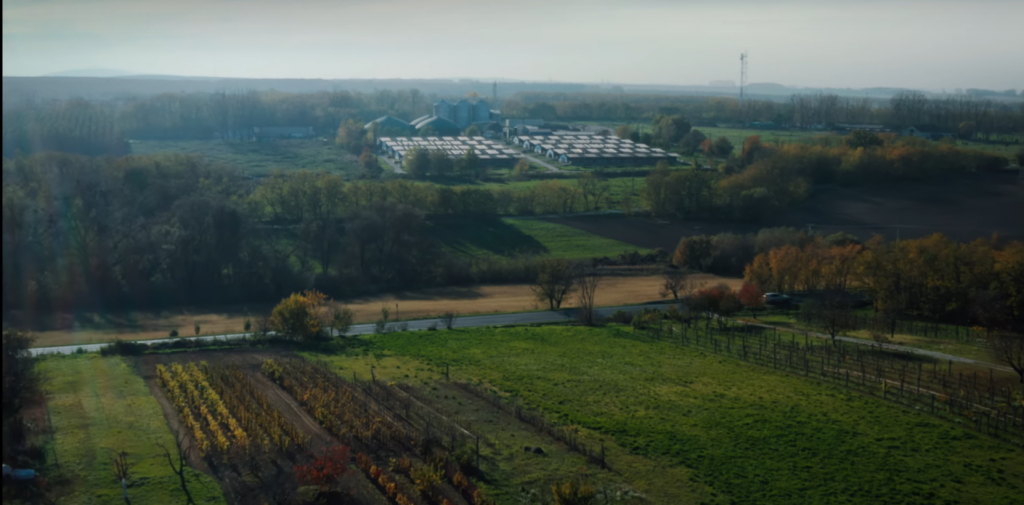Across the Hungarian countryside, the industrial rise of animal factories is leaving more than just a mark on the landscape.
In the towns of Kisbér and Dunakiliti, communities are fighting to reclaim clean air, water, and peace of mind. With support from Magyar Természetvédők Szövetsége / Friends of the Earth Hungary that ranges from legal advice, community organizing assistance to communication and small grants, these residents are standing up against Big Agri whose facilities threaten local communities’s quality of life.
Kisbér: legal victory and community solidarity
In Kisbér, a pig farm and a connected biogas plant have been causing serious environmental problems for years, including odour, noise, and suspected water contamination. A group of local residents formed a legal association and filed a lawsuit against the company. The lawsuit has been ongoing for five years, but the foul odour has been present in the town for twelve.
Over the past year, FoE Hungary maintained close contact with the group, the mayor, and legal experts. They monitored the progress of the case and produced a documentary film about the community’s struggle, which was disseminated widely. The film drew significant attention to the case, but also provoked a hostile response from the owner, who made threats and demanded its removal.
The film has already been viewed by thousands, and many have commented or sent private messages saying that similar problems also exist in their own towns.
Additionally, FoE Hungary supported community organising through a regranting scheme and participated in two local forums to provide information and tools to the residents.
The lawsuit ended in a partial but meaningful victory: the court ruled in favour of the plaintiffs who live within 1300 meters of the plant, but those living further away lost the case and were ordered to pay legal costs. Despite this, the community remained united, the group decided to share both the gains and losses equally among themselves. This strong solidarity is a powerful example of local cooperation. However, the company is expected to request a judicial review by the Curia (Hungarian Supreme Court), so the legal battle is not over yet.
Dunakiliti: a community awakens
The impact of the Kisbér documentary reached Dunakiliti, where residents contacted FoE Hungary after seeing the film. A large-scale dairy cattle facility operates near the town, with a herd size far beyond what the location can reasonably handle. The operation causes unbearable smells, noise, and pollution from manure spread near homes. Meanwhile, the permitting process for a new biogas plant has started, but residents are calling for a thorough investigation of pollution from the existing facility.
At a well-attended public forum, also attended by the Minister of Agriculture, who is also the local MP, the Kisbér film was screened and made a strong impression.
FoE Hungary provided the local community with:
- legal advice on how to establish a civil society organisation,
- a public workshop about legal tools and environmental rights,
- guidance on how to take legal and administrative steps against the industrial faclity,
- support with community organising strategies.
Through a regranting fund, the community was able to carry out water testing in local wells to check for possible contamination by the cattle farm. The results were alarming: E. coli bacteria were detected, suggesting that manure runoff may be seeping into the groundwater. Based on FoE Hungary’s recommendations, residents submitted a public interest complaint to trigger an official environmental investigation.
National-level impact and community learning
Beyond these two towns, FoE Hungary also worked to bring national attention to the wider issue of industrial pollution and weak environmental enforcement. They submitted a detailed report to the Office of the Commissioner for Fundamental Rights. In response, the Ombudsman for Future Generation released a significant statement analysing the environmental impact of these facilities and the limited tools available to affected communities from a fundamental rights perspective. The statement urged authorities to take meaningful action and called on lawmakers to create stronger, more protective regulations.
To help communities understand and use legal tools more effectively, FoE Hungary organised a training in the village of Ászár, led by an environmental law expert from the University of Pécs. Participants received both general legal education and tailored advice related to their specific local cases.
They also maintained contact with residents in other affected towns, including Ászár and Mezőfalva. The exchange of knowledge and experience among these communities plays a vital role in empowering rural people to respond to environmental injustice.







